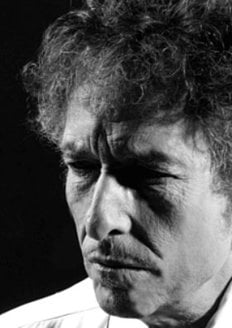Bob Dylan
Biographical

Bob Dylan was born on May 24, 1941 in Duluth, Minnesota. He grew up in the city of Hibbing. As a teenager, he played in various bands and with time his interest in music deepened, with a particular passion for American folk music and blues. One of his idols was the folk singer Woody Guthrie. He was also influenced by the early authors of the Beat Generation, as well as by modernist poets.
Dylan moved to New York City in 1961 and began to perform in clubs and cafés in Greenwich Village. He met the record producer John Hammond, with whom he signed a contract for his debut album, Bob Dylan (1962). In the following years, he recorded a number of albums which have had a tremendous impact on popular music: Bringing It All Back Home and Highway 61 Revisited in 1965, Blonde On Blonde in 1966 and Blood On The Tracks in 1975. His productivity continued in the following decades, resulting in masterpieces like Oh Mercy (1989), Time Out of Mind (1997) and Modern Times (2006).
Dylan’s tours in 1965 and 1966 attracted a lot of attention. For a period, he was accompanied by film maker D. A. Pennebaker, who documented life around the stage in what would come to be the movie Dont Look Back (1967). Dylan has recorded a large number of albums revolving around topics such as: the social conditions of man, religion, politics and love. The lyrics have continuously been published in new editions starting in 1973, under the title WritingsandDrawings, subsequently changed to Lyrics. As an artist, he is strikingly versatile; he has been active as a painter, actor and scriptwriter.
Besides his large production of albums, Dylan has published experimental work like the prose poetry collection Tarantula (1971). He has written an autobiography, Chronicles (2004), which depicts memories from the early years in New York and which provides glimpses of his life at the center of popular culture. Since the late 1980s, Bob Dylan has toured consistently, playing over 3000 concerts during the last 20 years. Dylan has the status of an icon. His influence on contemporary culture is profound, and he is the object of a steady stream of literary and musical analysis.
This autobiography/biography was written at the time of the award and later published in the book series Les Prix Nobel/ Nobel Lectures/The Nobel Prizes. The information is sometimes updated with an addendum submitted by the Laureate.
Nobel Prizes and laureates
Six prizes were awarded for achievements that have conferred the greatest benefit to humankind. The 12 laureates' work and discoveries range from proteins' structures and machine learning to fighting for a world free of nuclear weapons.
See them all presented here.
